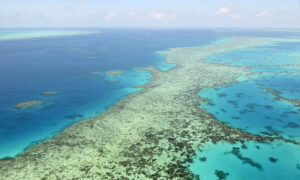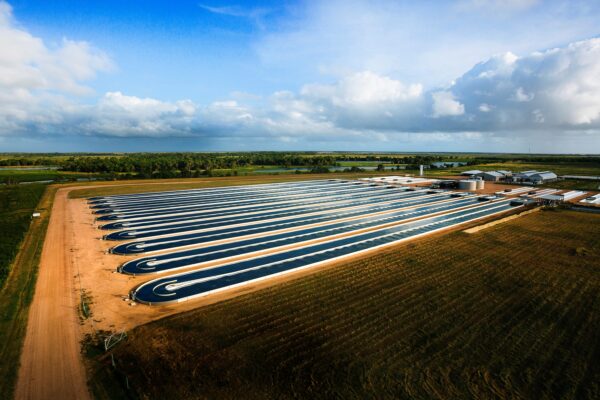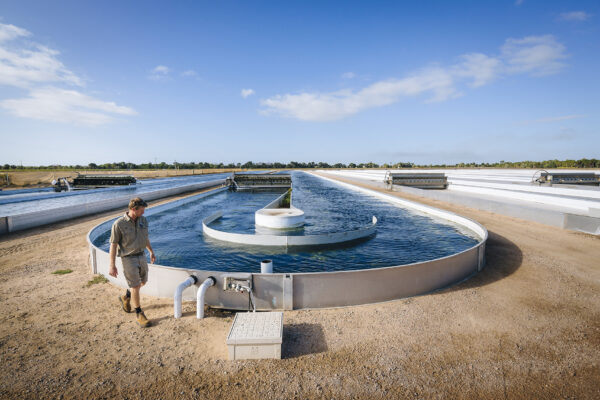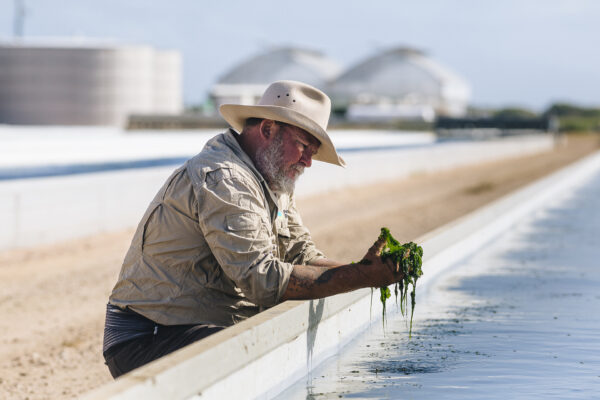New Wastewater Technology to Clean Great Barrier Reef With Macroalgae
Australian researchers have come up with a new wastewater technology to clean the waterways of the Great Barrier Reef, one of the nation’s most precious natural assets.Developed by biotechnology company Pacific Bio, the RegenAqua technology uses native Australian seaweed and macroalgae, combined with sunlight, to remove harmful nutrients from wastewater before it enters waterways and pollutes the Great Barrier Reef. RegenAqua Burdekin Facility (supplied). Researched over ten years at James Cook University in Queensland, the world-first technology removes contaminants such as phosphorus and nitrogen from municipal wastewater treatment plants, aquaculture farming, abattoirs, and agriculture, improving water quality. “RegenAqua is a game-changer for the health of the Great Barrier Reef,” said Prof. Tim Flannery, Australian of The Year. “[It has] incredible potential for removing harmful nutrients from our aquatic environment and significantly improving coastal and reef ecosystems Australia-wide.” “It’s an absolute no-brainer sustainable solution that’s going to change the landscape of industries for the better,” Flannery continued. “The announcement of this project moving forward confirms the industry’s confidence in RegenAqua’s technology, and I am excited to witness the results.” RegenAqua Burdekin Facility (supplied). Through the implementation of RegenAqua, Pacific Bio plans to address the 22 highest volume sewage treatment plants in municipal locations along the Queensland coast. “A RegenAqua solution at these sites will remove ~508 tonnes of dissolved inorganic nitrogen currently being discharged into the Great Barrier Reef catchment, solving for 14 percent of reef water quality targets set by the Australian and Queensland Governments,” according to the company’s website. “This ground-breaking technology is a low-cost, zero-carbon circular economy solution that firstly captures harmful nutrients from wastewater, and secondly, harvests and repurposes the algae into high crop yielding bio-stimulants for farmers, via a product called PlantJuice,” Pacific Bio CEO Sam Bastounas said. “Assessments of competing traditional wastewater treatment processes have shown RegenAqua to cost one-quarter of the capital and one-fifth of the operating expenses.” The RegenAqua technology uses macroalgae to remove harmful nutrients from wastewater. (supplied) The launch of the new technology comes after a successful project at Burdekin Shire Council’s Ayr-Brandon wastewater treatment facility. “Council, together with James Cook University and Pacific Bio (RegenAqua), has invested significantly in the macroalgal bioremediation urban waste project, which will revolutionise the treatment of wastewater for all smaller coastal Councils,” Burdekin Shire Council Mayor Lyn McLaughlin said. Other than Burdekin Shire Council, Pacific Bio is also working closely with officials at Townsville City and Hinchinbrook Shire, hoping to implement the technology there. “Completion of these three sites will provide a foundation that will enable RegenAqua macroalgal wastewater treatment to be adopted by other councils across the North Queensland east coast,” reads the website. Follow

Australian researchers have come up with a new wastewater technology to clean the waterways of the Great Barrier Reef, one of the nation’s most precious natural assets.
Developed by biotechnology company Pacific Bio, the RegenAqua technology uses native Australian seaweed and macroalgae, combined with sunlight, to remove harmful nutrients from wastewater before it enters waterways and pollutes the Great Barrier Reef.

Researched over ten years at James Cook University in Queensland, the world-first technology removes contaminants such as phosphorus and nitrogen from municipal wastewater treatment plants, aquaculture farming, abattoirs, and agriculture, improving water quality.
“RegenAqua is a game-changer for the health of the Great Barrier Reef,” said Prof. Tim Flannery, Australian of The Year. “[It has] incredible potential for removing harmful nutrients from our aquatic environment and significantly improving coastal and reef ecosystems Australia-wide.”
“It’s an absolute no-brainer sustainable solution that’s going to change the landscape of industries for the better,” Flannery continued. “The announcement of this project moving forward confirms the industry’s confidence in RegenAqua’s technology, and I am excited to witness the results.”

Through the implementation of RegenAqua, Pacific Bio plans to address the 22 highest volume sewage treatment plants in municipal locations along the Queensland coast.
“A RegenAqua solution at these sites will remove ~508 tonnes of dissolved inorganic nitrogen currently being discharged into the Great Barrier Reef catchment, solving for 14 percent of reef water quality targets set by the Australian and Queensland Governments,” according to the company’s website.
“This ground-breaking technology is a low-cost, zero-carbon circular economy solution that firstly captures harmful nutrients from wastewater, and secondly, harvests and repurposes the algae into high crop yielding bio-stimulants for farmers, via a product called PlantJuice,” Pacific Bio CEO Sam Bastounas said.
“Assessments of competing traditional wastewater treatment processes have shown RegenAqua to cost one-quarter of the capital and one-fifth of the operating expenses.”

The launch of the new technology comes after a successful project at Burdekin Shire Council’s Ayr-Brandon wastewater treatment facility.
“Council, together with James Cook University and Pacific Bio (RegenAqua), has invested significantly in the macroalgal bioremediation urban waste project, which will revolutionise the treatment of wastewater for all smaller coastal Councils,” Burdekin Shire Council Mayor Lyn McLaughlin said.
Other than Burdekin Shire Council, Pacific Bio is also working closely with officials at Townsville City and Hinchinbrook Shire, hoping to implement the technology there.
“Completion of these three sites will provide a foundation that will enable RegenAqua macroalgal wastewater treatment to be adopted by other councils across the North Queensland east coast,” reads the website.












